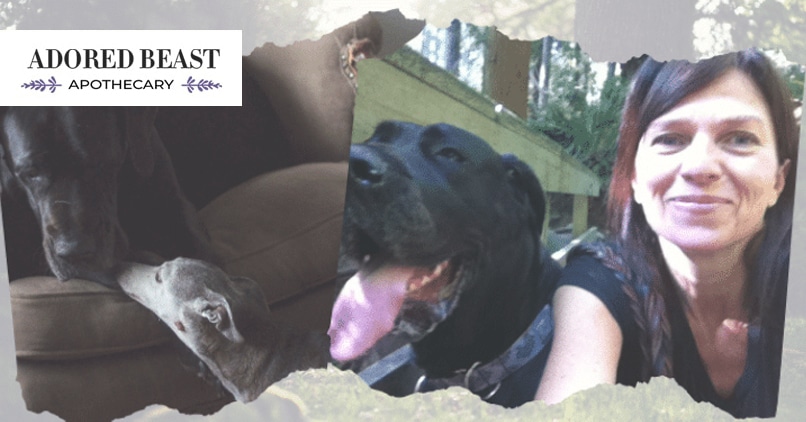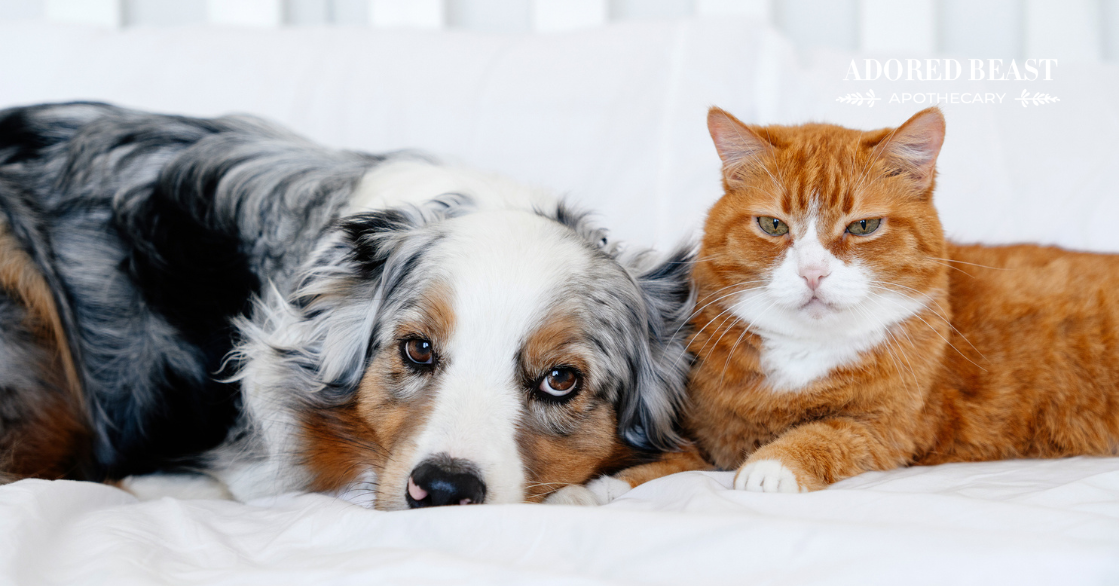The impact of a spay or neuter on dogs is a controversial topic. It is one that many pet parents struggle with when it comes to their animals’ health.
Did you know that there’s an important connection between sex and your dog’s bone health? Well, sex hormones, but still.
I’ve known for a very long time that the sex hormones impact not only your dog’s bone health, but overall health in general – everything from arthritis, anxiety, and aggression, to bladder control, dental health, the immune system, and more.
As I said, I’ve known about this connection for a long time, but I never imagined the real impact spaying could have until it happened suddenly to my own dog, Della.
I want to tell you Della’s story in the hopes that you’ll feel better informed when it comes to making this life-changing decision. The decision to spay or neuter is one that should only be made after you know the overall impacts on your animal’s health.
Della’s Dramatic Change
When my 145 pound Great Dane-English Mastiff cross Della was 9, I had to make a decision that dramatically altered her life: she had to be spayed.
Della had been as healthy as a horse her whole life (and almost as tall as one!). She’d always been raw fed, had never been vaccinated, and had lived a totally free life on my farm. She grew up with blue heelers and Italian greyhounds so she was super active for a really big dog. She learned very quickly that she couldn’t run under the horse fence so when the heelers went under, she went over. Yup. Right over a 4 1⁄2 foot fence and on a really regular basis!
Even at 9 years old, when she came to bed at night, she would jump from a standstill up onto my 3 1⁄2 foot high Princess and the Pea bed, leaping over my cats and other dogs without blinking. She would land by my pillow and make a nest, thinking she was an Italian greyhound! She was solid muscle and a perfect specimen for a healthy large breed dog.
However, at 9, Della developed pyometra and unfortunately needed to be spayed. Within 30 days of her spay she had to have her hind end lifted to get onto my bed. She started panting and developed 25% more grey on her muzzle. She aged right before my eyes.
Normal Aging?
For many, this may seem like a normal part of the aging process. If you’re over the age of 40 reading this, you know what I’m talking about. In fact, Anti-Aging is now a board certification process for MDs in human medicine. It primarily addresses decreased or abnormal hormone function in men and women.
Of course, I wanted to know more, so I interviewed 2 MDs to find out why the surge of interest in hormones. To my surprise, it had nothing to do with wrinkles or libido. Instead, it had to do with arthritis, heart health, thyroid disease, muscle weakness, and autoimmune disease.
One of those doctors was an emergency room doc. After years in emerge, he said he got to a place where he needed to try and find a way to prevent so many chronic illnesses that were virtually untreatable and caused so much suffering. When he learned how many were caused by hormonal dysfunction he knew he had to become re-educated.
I knew I needed to do the same, so I dug into the research, only focusing on animals rather than humans. Here’s what I found.
The Negative Effects of Sex Hormone Loss
Dogs and humans have very similar metabolic pathways and our DNA is about 82% the same. Cancer in humans has risen exponentially, and it’s the same with dogs. I find it fascinating to look at inflammation and its contribution to cancer and the links to hormone imbalance and inflammation. I see a very strong link when we study all the estrogen and hormone disrupting chemicals in our dogs’ food, our food, our water, our cosmetics, water bowls, cleaning products, material fire retardants, packaging products and more… then add spay and neuter to the mix…
So, what does sex hormone deficiency cause? What are some of the ways that spay or neuter and sex hormone deficiencies can affect your dog and you?
- Bones and joints – Hormone loss causes an increase in joint inflammation leading to arthritis. It decreases bone mineral content and causes cervical and spinal stenosis. Stenosis is a narrowing of the open spaces within the spine, which can put pressure on the spinal cord and the nerves that travel through the spine leading to problems like myelopathy or hind end paralysis.
- Ligaments and tendons – Hormone loss decreases ligament and tendon strength, which causes joint instability as we see with cruciate ligament injuries and tears.
- Muscles – Lean muscle mass is directly impaired by hormone loss. In my experience, this is more detrimental than we think, as the muscles form a huge support system for the joints. Increasing exercise helps with this, but if the hormones have affected the joints or ligaments as well, it becomes more of an overall issue and can put your dog on the lameness merry-go-round.
- Geriatric cognitive disorder – Dementia can also be attributed to a decrease in sex hormones. How many of you have dogs that have become more anxious as they age?
- Metabolic disease – When your dog’s lacking in sex hormones there are so many other symptoms that can mimic other metabolic diseases. Slower metabolic rates lead to panting, weight gain and constant hunger. How many of your dogs have been checked for hypothyroidism or Cushing’s because they exhibit these symptoms, yet the test has come back negative or normal?
- Teeth – We often forget that teeth are part of the bone family. When there are deficiencies in sex hormones, there’s a drop in bone mineral content. This weakens the alveolar sockets in the jaws that hold the roots of the teeth. When this happens, we can see weaker tooth anchorage, weaker jawbones, and increased gum disease, tooth loss and pain.
- Spay incontinence – The uncontrolled leaking of urine is another hormone deficiency problem.
- Sex hormones and thyroid function – It’s common knowledge that the thyroid, adrenals, and sex hormones are a very well tuned, balanced system, so if you remove one of the key players it’s only common sense that it will play havoc on the remaining glands. How many dogs do you know with hypothyroidism, Cushing’s or Addison’s? This isn’t a coincidence. When a part of the body or organ is removed, one of the ways the body survives is for the supporting anatomy to take over and compensate.
That leads to the over- or under-functioning of that system. In this case, removal of sex organs forces the pituitary, adrenals, and thyroid to compensate.
Best Time to Spay or Neuter
No matter how you look at it, spay and neuter is a controversial topic. If you decide to spay or neuter your dog, I recommend waiting to spay your female dog until after the first heat, and find a vet who’ll do ovary sparing spay. Male dogs should be neutered after one year of age.
We can’t grow the testicles, ovaries, or uterus back within our dogs but we can nurture the supporting glands to stay healthy and provide homeopathic and natural supports for the lack of sex hormones. If it’s possible to do that and try to follow our clinic protocol (below), you’ll be doing the best you possibly can to support and help prevent the adverse effects of sex hormone deficiency, and reduce the risk of over-population.
The protocol we followed at our clinic was:
- Raw food with glands mixed in
- As many bioavailable amino acids as you can (our favourite is phytoplankton)
- Homeopathic remedies made from canine testes and ovaries
- Hemp oil for good quality non-GMO, clean, essential fat
- Loads of exercise in fresh air to alleviate stress
- Lots of raw meaty bones to increase endorphins and calming qualities
Now back to my beautiful girl, one of my biggest life teachers, Della. I started her on the homeopathic spay protocol and increased her amino acids. Della was the love of my life. Given her breed and age she was totally awesome – and in my eyes she will always be my perfect specimen of a large breed dog.
I hope this has shed some light with this controversial topic but please do not forget, we are all doing our best for our best friends and it’s just so great we have more and more support to do it 🙂












